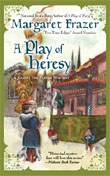CHAPTER 12
The work with Dick went well enough, and Joliffe told him so. That did not keep the boy from bolting out the yard’s rear gate as soon as Joliffe released him. Powet, watching his great-nephew escape, suggested they leave the same way. “So as not to trouble my niece, you know.”
More likely to avoid being called to account for Dick’s disappearance, Joliffe guessed, but agreed. His own motives were mixed and he regretted that. He liked Powet, understood somewhat the hurt the man was in, but beyond that he was not likely to have a better source than Powet for matters in Coventry and about Kydwa. That made of value every chance to talk with him and draw him out…
Old John Kydwa quotes from the book of Ecclesiastes in this chapter, but while the words are close enough to the familiar form in more modern bibles for the verse to be identifiable, they’re nonetheless different enough to ring strange. That’s because they’re drawn from the medieval English Bible of John Wycliffe.
There are a number of misconceptions regarding this early translation of the Bible. For one thing, bibles in the vernacular were not a new phenomenon, either in English or other languages. As early as the 700s portions of the Bible were being translated into Old English and German and surely other languages. By the end of the 1100s there were enough vernacular versions abroad in Europe – and several powerful heresies using them – that the pope banned versions of the Bible not authorized by the Church. Still, in the late 1200s there was a complete Bible in French, with no sign that the Church tried to suppress it, and around the mid-1300s there was a Czech translation of the whole Bible, a few decades ahead of Wyclif’s Bible in the 1380s.
So the concept of a Bible in the language of ordinary people was not a cause of trouble in itself. In truth, reading the Bible in English was not automatically punishable as heresy. The heresy lay in using what you interpreted from the Bible as reason to challenge and deny the Church’s authority. Telling the Church it was wrong and refusing to obey it – that was heresy, and all the more infuriating to the Church because the refusal was usually accompanied by a matching refusal to fulfill the monetary duties the Church required of good Christians.
In England, the heresy that arose in the late 1300s was Lollardy, and its challenge to the Church reached such a pitch that Wyclif’s Bible was banned in 1408. Even then, however, it was not absolutely illegal to possess a copy of it. Copies appear listed among the books of a number of nobles, including the famously pious King Henry VI himself, and it can be a fair assumption that many more people had copies that have escaped the records. In fact, texts from the Wyclif Bible exist in more than 250 medieval manuscripts, more than for any other piece of Middle English literature. True, by the time of A Play of Heresy it was necessary to have official permission from the Church to possess a copy, but that was not impossible to get nor would it immediately brand you a heretic.
As for reading Wyclif’s Bible today, the language can be dense and difficult going, but every once in a while some familiar passage lights up with a fresh seeming because the words are different. Perhaps my favorite is from the Psalms: “. . . and my cuppe, fillinge greetli, is ful cleer. And thi merci schal sue me; in alle the daies of my lijf. And that Y dwelle in the hows of the Lord; in to the lengthe of daies.” — . . . and my cup is greatly filled full clear. And thy mercy shall pursue me in all the days of my life. And I [will] dwell in the house of the Lord into the length of days.”
– Margaret
Follow the virtual bookclub for A Play of Heresy on Facebook and Twitter.
















